Ethics and Sustainability Report: Ethical Frameworks and ANZ Bank
VerifiedAdded on 2023/01/10
|6
|1099
|31
Report
AI Summary
This report examines ethical issues at the Australia and New Zealand Banking Group (ANZ), focusing on white-collar crime and unethical practices related to financial distress of rural families. The introduction establishes the importance of business ethics, followed by the identification of two key issues: the bank's involvement in fixing the bank-bill swap rate (a white-collar crime) and its unfair treatment of rural families facing financial difficulties. The report then applies the Virtue approach to address the first issue, emphasizing the importance of employees' personal ethical obligations, and Utilitarianism to the second, highlighting the need for actions that benefit stakeholders. The conclusion underscores the importance of integrating ethical policies into organizational practices, including training and performance management. The report provides a framework for ethical decision-making and suggests ways to improve corporate behavior. The document is contributed by a student to be published on the website Desklib. Desklib is a platform which provides all the necessary AI based study tools for students.
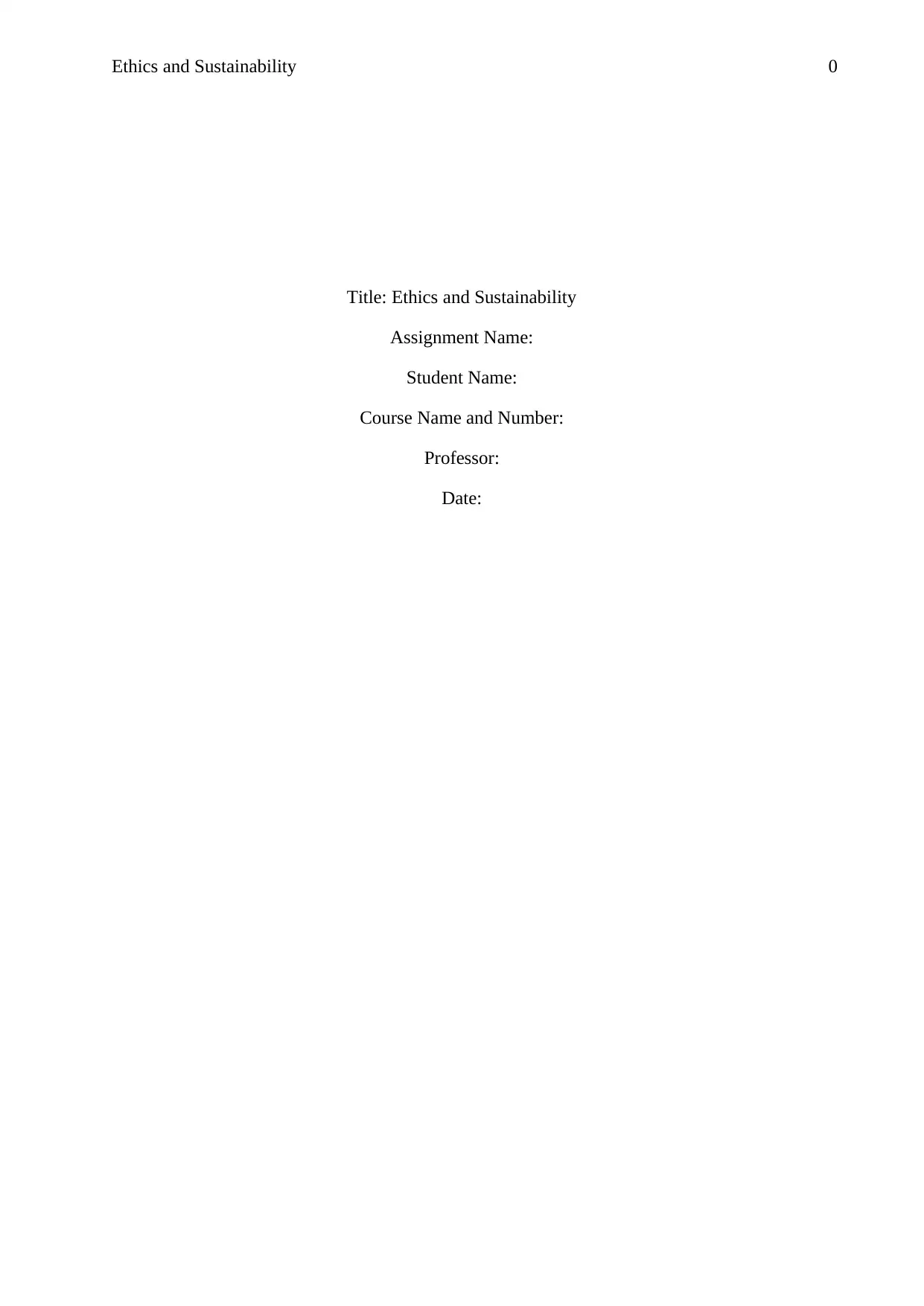
Ethics and Sustainability 0
Title: Ethics and Sustainability
Assignment Name:
Student Name:
Course Name and Number:
Professor:
Date:
Title: Ethics and Sustainability
Assignment Name:
Student Name:
Course Name and Number:
Professor:
Date:
Paraphrase This Document
Need a fresh take? Get an instant paraphrase of this document with our AI Paraphraser
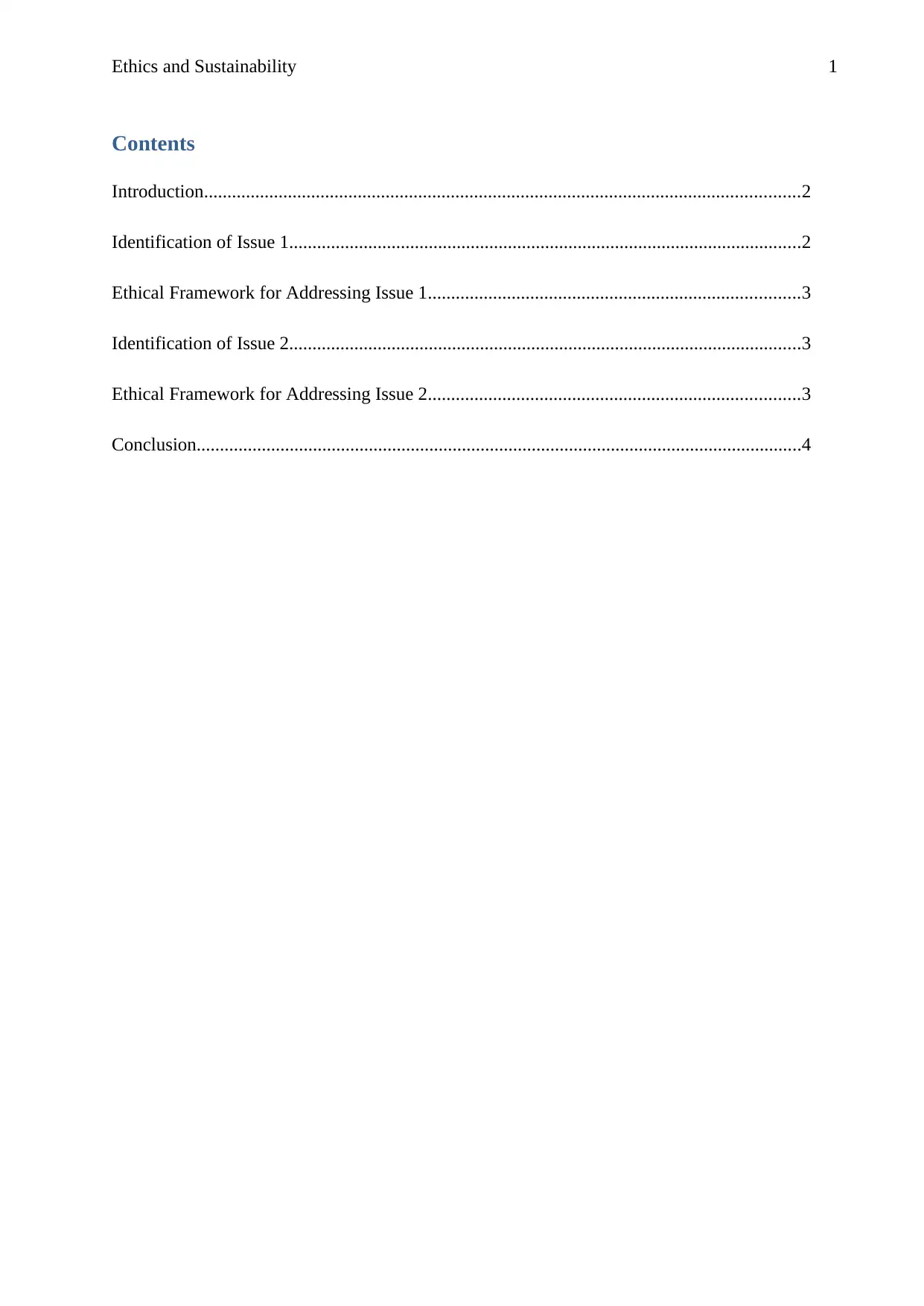
Ethics and Sustainability 1
Contents
Introduction................................................................................................................................2
Identification of Issue 1..............................................................................................................2
Ethical Framework for Addressing Issue 1................................................................................3
Identification of Issue 2..............................................................................................................3
Ethical Framework for Addressing Issue 2................................................................................3
Conclusion..................................................................................................................................4
Contents
Introduction................................................................................................................................2
Identification of Issue 1..............................................................................................................2
Ethical Framework for Addressing Issue 1................................................................................3
Identification of Issue 2..............................................................................................................3
Ethical Framework for Addressing Issue 2................................................................................3
Conclusion..................................................................................................................................4
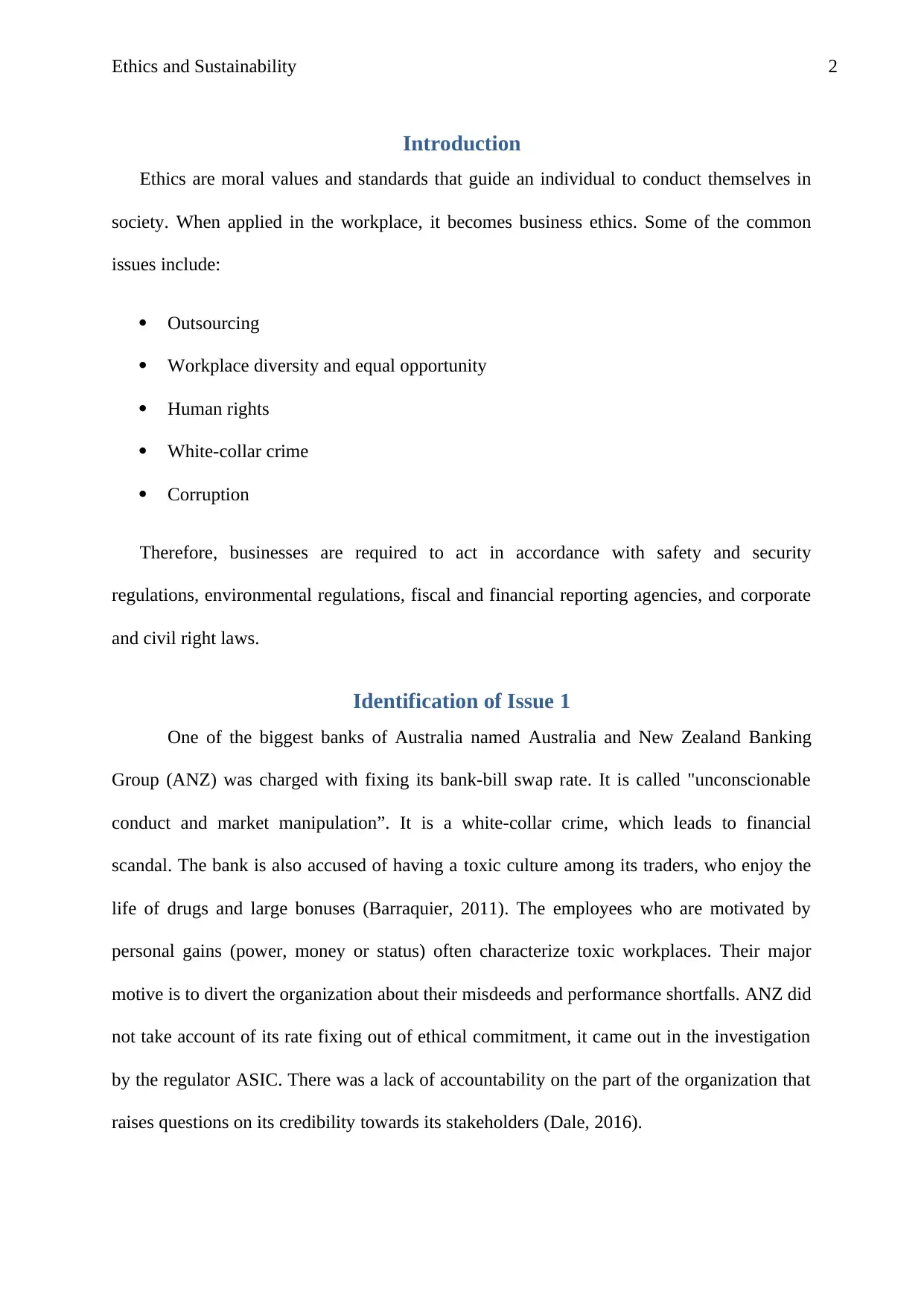
Ethics and Sustainability 2
Introduction
Ethics are moral values and standards that guide an individual to conduct themselves in
society. When applied in the workplace, it becomes business ethics. Some of the common
issues include:
Outsourcing
Workplace diversity and equal opportunity
Human rights
White-collar crime
Corruption
Therefore, businesses are required to act in accordance with safety and security
regulations, environmental regulations, fiscal and financial reporting agencies, and corporate
and civil right laws.
Identification of Issue 1
One of the biggest banks of Australia named Australia and New Zealand Banking
Group (ANZ) was charged with fixing its bank-bill swap rate. It is called "unconscionable
conduct and market manipulation”. It is a white-collar crime, which leads to financial
scandal. The bank is also accused of having a toxic culture among its traders, who enjoy the
life of drugs and large bonuses (Barraquier, 2011). The employees who are motivated by
personal gains (power, money or status) often characterize toxic workplaces. Their major
motive is to divert the organization about their misdeeds and performance shortfalls. ANZ did
not take account of its rate fixing out of ethical commitment, it came out in the investigation
by the regulator ASIC. There was a lack of accountability on the part of the organization that
raises questions on its credibility towards its stakeholders (Dale, 2016).
Introduction
Ethics are moral values and standards that guide an individual to conduct themselves in
society. When applied in the workplace, it becomes business ethics. Some of the common
issues include:
Outsourcing
Workplace diversity and equal opportunity
Human rights
White-collar crime
Corruption
Therefore, businesses are required to act in accordance with safety and security
regulations, environmental regulations, fiscal and financial reporting agencies, and corporate
and civil right laws.
Identification of Issue 1
One of the biggest banks of Australia named Australia and New Zealand Banking
Group (ANZ) was charged with fixing its bank-bill swap rate. It is called "unconscionable
conduct and market manipulation”. It is a white-collar crime, which leads to financial
scandal. The bank is also accused of having a toxic culture among its traders, who enjoy the
life of drugs and large bonuses (Barraquier, 2011). The employees who are motivated by
personal gains (power, money or status) often characterize toxic workplaces. Their major
motive is to divert the organization about their misdeeds and performance shortfalls. ANZ did
not take account of its rate fixing out of ethical commitment, it came out in the investigation
by the regulator ASIC. There was a lack of accountability on the part of the organization that
raises questions on its credibility towards its stakeholders (Dale, 2016).
⊘ This is a preview!⊘
Do you want full access?
Subscribe today to unlock all pages.

Trusted by 1+ million students worldwide
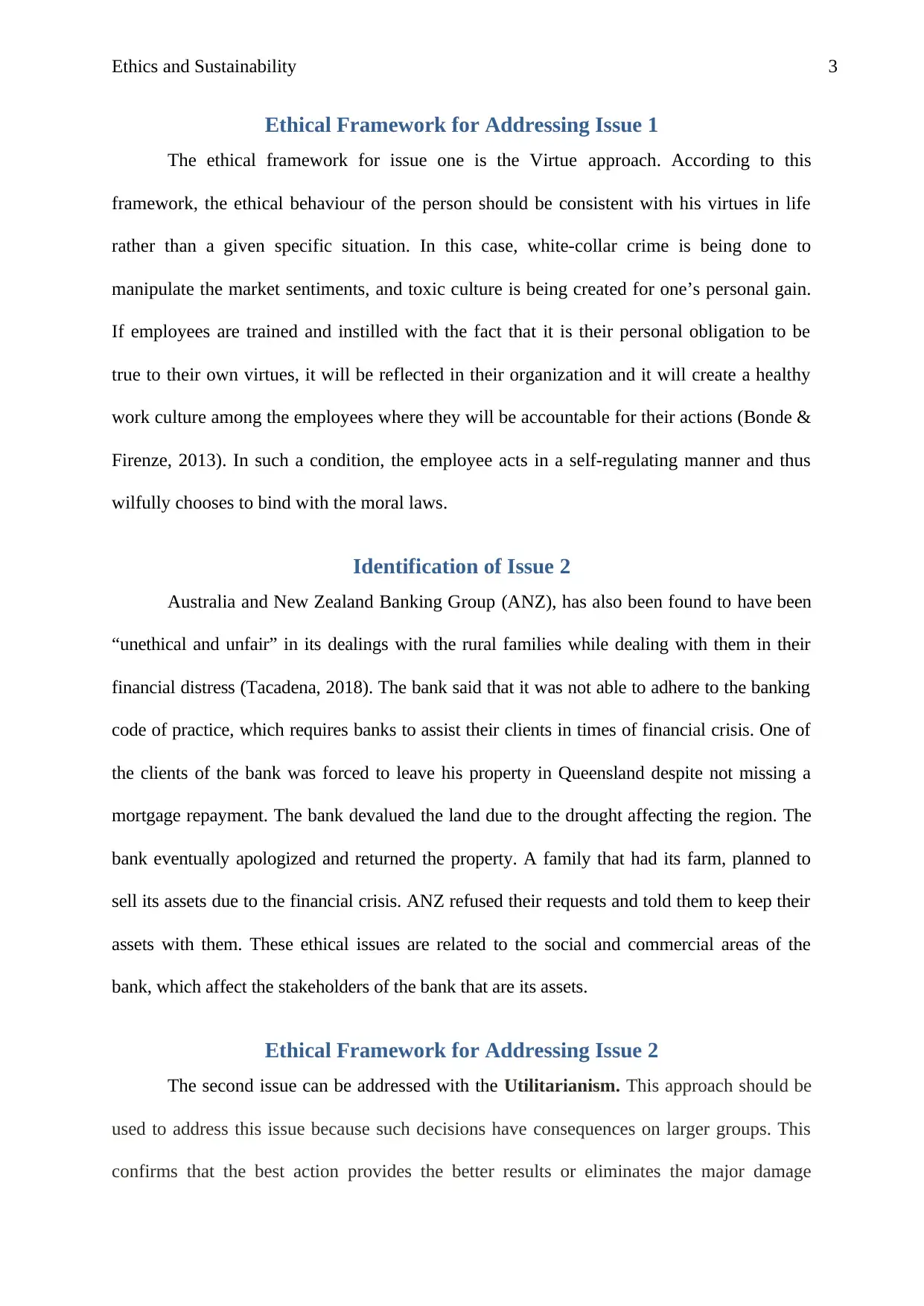
Ethics and Sustainability 3
Ethical Framework for Addressing Issue 1
The ethical framework for issue one is the Virtue approach. According to this
framework, the ethical behaviour of the person should be consistent with his virtues in life
rather than a given specific situation. In this case, white-collar crime is being done to
manipulate the market sentiments, and toxic culture is being created for one’s personal gain.
If employees are trained and instilled with the fact that it is their personal obligation to be
true to their own virtues, it will be reflected in their organization and it will create a healthy
work culture among the employees where they will be accountable for their actions (Bonde &
Firenze, 2013). In such a condition, the employee acts in a self-regulating manner and thus
wilfully chooses to bind with the moral laws.
Identification of Issue 2
Australia and New Zealand Banking Group (ANZ), has also been found to have been
“unethical and unfair” in its dealings with the rural families while dealing with them in their
financial distress (Tacadena, 2018). The bank said that it was not able to adhere to the banking
code of practice, which requires banks to assist their clients in times of financial crisis. One of
the clients of the bank was forced to leave his property in Queensland despite not missing a
mortgage repayment. The bank devalued the land due to the drought affecting the region. The
bank eventually apologized and returned the property. A family that had its farm, planned to
sell its assets due to the financial crisis. ANZ refused their requests and told them to keep their
assets with them. These ethical issues are related to the social and commercial areas of the
bank, which affect the stakeholders of the bank that are its assets.
Ethical Framework for Addressing Issue 2
The second issue can be addressed with the Utilitarianism. This approach should be
used to address this issue because such decisions have consequences on larger groups. This
confirms that the best action provides the better results or eliminates the major damage
Ethical Framework for Addressing Issue 1
The ethical framework for issue one is the Virtue approach. According to this
framework, the ethical behaviour of the person should be consistent with his virtues in life
rather than a given specific situation. In this case, white-collar crime is being done to
manipulate the market sentiments, and toxic culture is being created for one’s personal gain.
If employees are trained and instilled with the fact that it is their personal obligation to be
true to their own virtues, it will be reflected in their organization and it will create a healthy
work culture among the employees where they will be accountable for their actions (Bonde &
Firenze, 2013). In such a condition, the employee acts in a self-regulating manner and thus
wilfully chooses to bind with the moral laws.
Identification of Issue 2
Australia and New Zealand Banking Group (ANZ), has also been found to have been
“unethical and unfair” in its dealings with the rural families while dealing with them in their
financial distress (Tacadena, 2018). The bank said that it was not able to adhere to the banking
code of practice, which requires banks to assist their clients in times of financial crisis. One of
the clients of the bank was forced to leave his property in Queensland despite not missing a
mortgage repayment. The bank devalued the land due to the drought affecting the region. The
bank eventually apologized and returned the property. A family that had its farm, planned to
sell its assets due to the financial crisis. ANZ refused their requests and told them to keep their
assets with them. These ethical issues are related to the social and commercial areas of the
bank, which affect the stakeholders of the bank that are its assets.
Ethical Framework for Addressing Issue 2
The second issue can be addressed with the Utilitarianism. This approach should be
used to address this issue because such decisions have consequences on larger groups. This
confirms that the best action provides the better results or eliminates the major damage
Paraphrase This Document
Need a fresh take? Get an instant paraphrase of this document with our AI Paraphraser
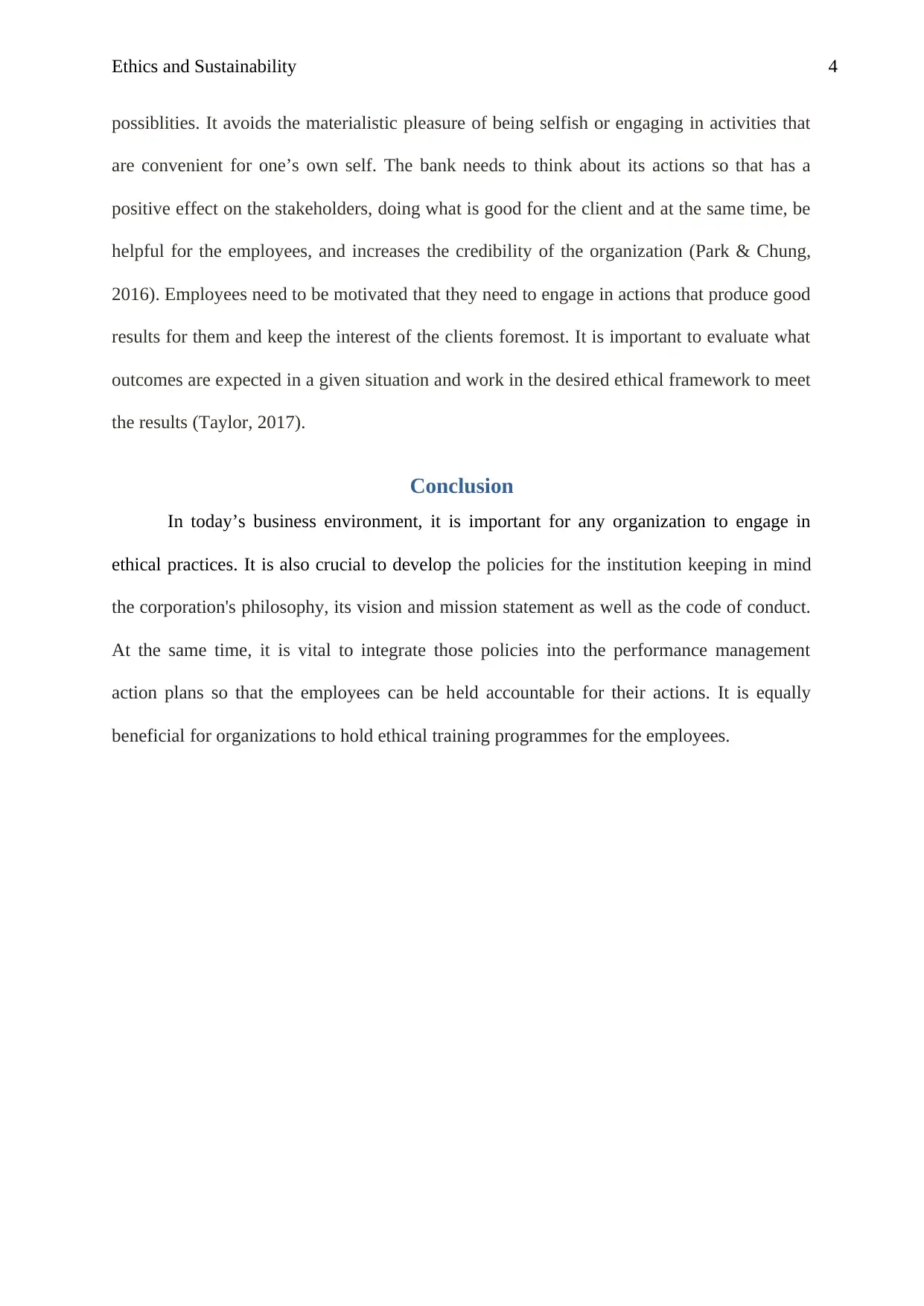
Ethics and Sustainability 4
possiblities. It avoids the materialistic pleasure of being selfish or engaging in activities that
are convenient for one’s own self. The bank needs to think about its actions so that has a
positive effect on the stakeholders, doing what is good for the client and at the same time, be
helpful for the employees, and increases the credibility of the organization (Park & Chung,
2016). Employees need to be motivated that they need to engage in actions that produce good
results for them and keep the interest of the clients foremost. It is important to evaluate what
outcomes are expected in a given situation and work in the desired ethical framework to meet
the results (Taylor, 2017).
Conclusion
In today’s business environment, it is important for any organization to engage in
ethical practices. It is also crucial to develop the policies for the institution keeping in mind
the corporation's philosophy, its vision and mission statement as well as the code of conduct.
At the same time, it is vital to integrate those policies into the performance management
action plans so that the employees can be held accountable for their actions. It is equally
beneficial for organizations to hold ethical training programmes for the employees.
possiblities. It avoids the materialistic pleasure of being selfish or engaging in activities that
are convenient for one’s own self. The bank needs to think about its actions so that has a
positive effect on the stakeholders, doing what is good for the client and at the same time, be
helpful for the employees, and increases the credibility of the organization (Park & Chung,
2016). Employees need to be motivated that they need to engage in actions that produce good
results for them and keep the interest of the clients foremost. It is important to evaluate what
outcomes are expected in a given situation and work in the desired ethical framework to meet
the results (Taylor, 2017).
Conclusion
In today’s business environment, it is important for any organization to engage in
ethical practices. It is also crucial to develop the policies for the institution keeping in mind
the corporation's philosophy, its vision and mission statement as well as the code of conduct.
At the same time, it is vital to integrate those policies into the performance management
action plans so that the employees can be held accountable for their actions. It is equally
beneficial for organizations to hold ethical training programmes for the employees.
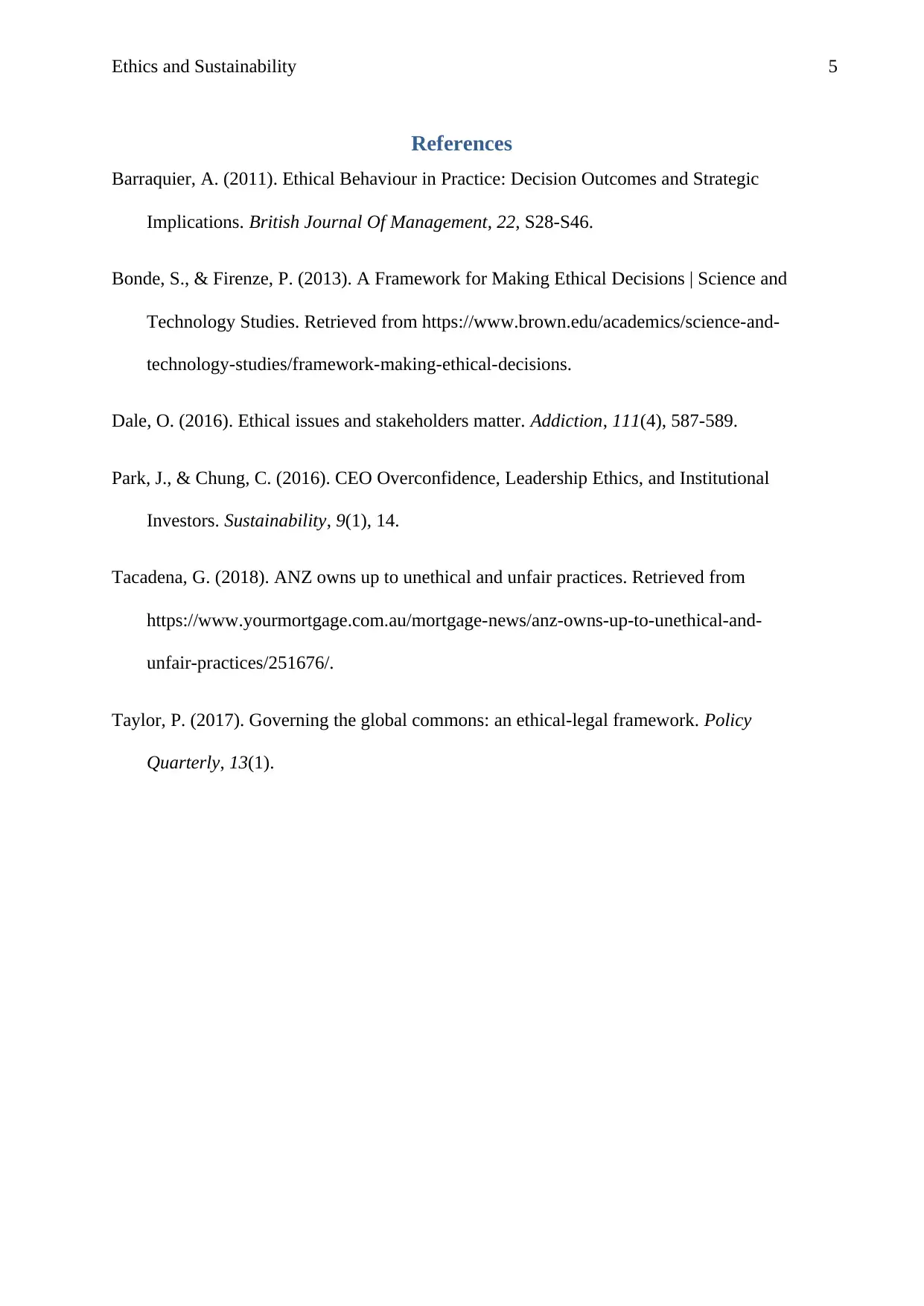
Ethics and Sustainability 5
References
Barraquier, A. (2011). Ethical Behaviour in Practice: Decision Outcomes and Strategic
Implications. British Journal Of Management, 22, S28-S46.
Bonde, S., & Firenze, P. (2013). A Framework for Making Ethical Decisions | Science and
Technology Studies. Retrieved from https://www.brown.edu/academics/science-and-
technology-studies/framework-making-ethical-decisions.
Dale, O. (2016). Ethical issues and stakeholders matter. Addiction, 111(4), 587-589.
Park, J., & Chung, C. (2016). CEO Overconfidence, Leadership Ethics, and Institutional
Investors. Sustainability, 9(1), 14.
Tacadena, G. (2018). ANZ owns up to unethical and unfair practices. Retrieved from
https://www.yourmortgage.com.au/mortgage-news/anz-owns-up-to-unethical-and-
unfair-practices/251676/.
Taylor, P. (2017). Governing the global commons: an ethical-legal framework. Policy
Quarterly, 13(1).
References
Barraquier, A. (2011). Ethical Behaviour in Practice: Decision Outcomes and Strategic
Implications. British Journal Of Management, 22, S28-S46.
Bonde, S., & Firenze, P. (2013). A Framework for Making Ethical Decisions | Science and
Technology Studies. Retrieved from https://www.brown.edu/academics/science-and-
technology-studies/framework-making-ethical-decisions.
Dale, O. (2016). Ethical issues and stakeholders matter. Addiction, 111(4), 587-589.
Park, J., & Chung, C. (2016). CEO Overconfidence, Leadership Ethics, and Institutional
Investors. Sustainability, 9(1), 14.
Tacadena, G. (2018). ANZ owns up to unethical and unfair practices. Retrieved from
https://www.yourmortgage.com.au/mortgage-news/anz-owns-up-to-unethical-and-
unfair-practices/251676/.
Taylor, P. (2017). Governing the global commons: an ethical-legal framework. Policy
Quarterly, 13(1).
⊘ This is a preview!⊘
Do you want full access?
Subscribe today to unlock all pages.

Trusted by 1+ million students worldwide
1 out of 6
Related Documents
Your All-in-One AI-Powered Toolkit for Academic Success.
+13062052269
info@desklib.com
Available 24*7 on WhatsApp / Email
![[object Object]](/_next/static/media/star-bottom.7253800d.svg)
Unlock your academic potential
Copyright © 2020–2026 A2Z Services. All Rights Reserved. Developed and managed by ZUCOL.




